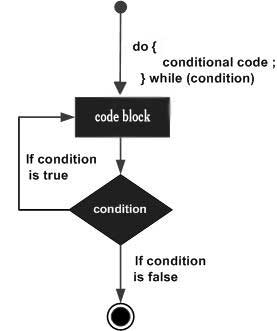LOOPS PART 3
DO WHILE :
Unlike for and while loops, which test the loop condition at the top of the loop, the do...while loop in C programming checks its condition at the bottom of the loop.
A do...while loop is similar to a while loop, except the fact that it is guaranteed to execute at least one time.
Syntax
The syntax of a do...while loop in C programming language is −
do {
statement(s);
} while( condition );
Notice that the conditional expression appears at the end of the loop, so the statement(s) in the loop executes once before the condition is tested.
If the condition is true, the flow of control jumps back up to do, and the statement(s) in the loop executes again. This process repeats until the given condition becomes false.
Flow Diagram

Example
#include <stdio.h> int main () { /* local variable definition */ int a = 10; /* do loop execution */ do { printf("value of a: %d\n", a); a = a + 1; }while( a < 20 ); return 0; }
When the above code is compiled and executed, it produces the following result −
value of a: 10 value of a: 11 value of a: 12 value of a: 13 value of a: 14 value of a: 15 value of a: 16 value of a: 17 value of a: 18 value of a: 19 C programming allows to use one loop inside another loop. The following section shows a few examples to illustrate the concept.
NESTED LOOPS :
Syntax
The syntax for a nested for loop statement in C is as follows −
for ( init; condition; increment ) {
for ( init; condition; increment ) {
statement(s);
}
statement(s);
}
The syntax for a nested while loop statement in C programming language is as follows −
while(condition) {
while(condition) {
statement(s);
}
statement(s);
}
The syntax for a nested do...while loop statement in C programming language is as follows −
do {
statement(s);
do {
statement(s);
}while( condition );
}while( condition );
A final note on loop nesting is that you can put any type of loop inside any other type of loop. For example, a 'for' loop can be inside a 'while' loop or vice versa.
Example
The following program uses a nested for loop to find the prime numbers from 2 to 100 −
#include <stdio.h> int main () { /* local variable definition */ int i, j; for(i = 2; i<100; i++) { for(j = 2; j <= (i/j); j++) if(!(i%j)) break; // if factor found, not prime if(j > (i/j)) printf("%d is prime\n", i); } return 0; }
When the above code is compiled and executed, it produces the following result −
2 is prime 3 is prime 5 is prime 7 is prime 11 is prime 13 is prime 17 is prime 19 is prime 23 is prime 29 is prime 31 is prime 37 is prime 41 is prime 43 is prime 47 is prime 53 is prime 59 is prime 61 is prime 67 is prime 71 is prime 73 is prime 79 is prime 83 is prime 89 is prime 97 is prime
Comments
Post a Comment